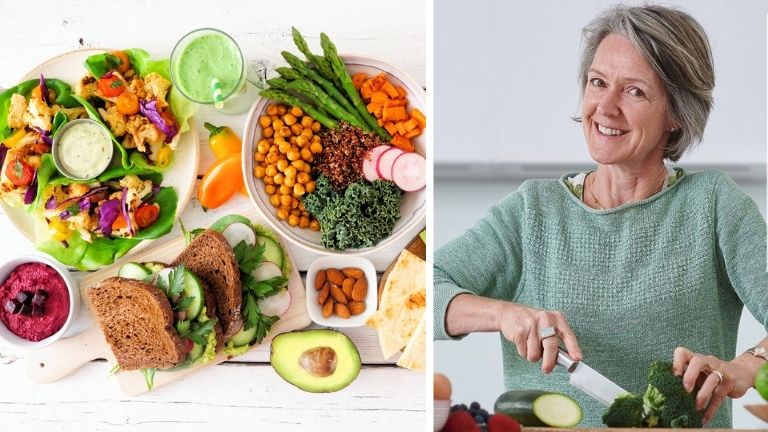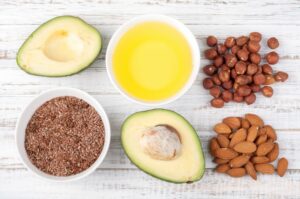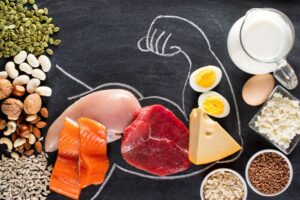Wondering what the best diet for menopause consists of? Dr Clare Bailey reveals 6 nutrition tips that will help you through the menopause
Weight gain and bloating are common symptoms women may experience during the menopause.
There are two mechanisms at work contributing to this during and after menopause. The first is that a decline in oestrogen triggers the ongoing storage of fat cells which can lead to overall weight gain.
a decline in oestrogen triggers the ongoing storage of fat cells
The second is that rising cortisol slows down digestion, which can lead to bloating and not feeling as satisfied as we should after eating.
The good news is, there are many healthy ways to support your digestive system and ensure that you don’t gain unnecessary weight during the menopause…
#1 Steer clear of processed food and try cooking from scratch
Full of all sorts of unknown substances, ‘ultra-processed’ foods are best avoided during the menopause.
Processed foods tend to have emulsifiers that upset your gut and they often contain significant levels of sweeteners, starch and carbohydrates.
A 2019 randomised controlled trial took 20 healthy adults and split them into two groups; the first group followed a diet of ultra-processed foods for two weeks, followed by two weeks of unprocessed foods and the second group did the opposite.
Processed foods tend to have emulsifiers that upset your gut
The meals provided to both groups were matched in terms of calories, energy density, macronutrients, sugar, sodium and fibre – each volunteer was advised to eat as much, or as little, as they wanted.
Interestingly, calorie intake was significantly higher (up to 500 calories) on days when the participants were given ultra-processed foods and on average, the subjects gained up to 0.9kg on an ultra-processed diet and lost up to 0.9kg eating an unprocessed diet, over the course of the two weeks.
The conclusion from this study was that limiting the intake of ultra-processed foods may help to prevent, and treat, obesity.
To avoid processed grub it’s best to cook your meals from scratch, this is beneficial for most women, not just menopausal women.
We all lead such busy lives but cooking from scratch doesn’t have to mean taking hours out of your day to prepare a healthy meal.
I work really hard on the recipes at The Fast 800 to keep them as quick to prepare and simple as possible, using as few ingredients as we can.
The idea is that most of the ingredients can be found in cupboards, from the fridge and the freezer at home, so it’s not too onerous cooking, it just makes life easier for all. By cooking like this, you know exactly what you’re eating, and you know what goes into it.
#2 Reduce alcohol intake
Also, if you’re experiencing weight-gain – one of the most common side effects of the menopause – I would suggest limiting your alcohol consumption.
Alcohol is wasted calories and contains high levels of sugar and carbohydrates that your body doesn’t need.
#3 Fill your plate with dark leafy greens and vegetables
Dark, leafy greens, like spinach and kale, have ample nutrients and have both been linked to improved heart health, weight loss and immunity.
However, if using raw, kale can be a little tough so just be sure to massage with a little olive oil before using it as the base of a salad.
The more colours you have on your plate, the more nutrients
Other great leaves include gem lettuce, rocket, chicory, swiss chard, watercress and romaine. This list is certainly not exhaustive; any leafy greens you enjoy will be a winner.
The more colours you have on your plate, the more nutrients! Load up on non-starchy vegetables in a variety of colours, adding vegetables, such as colourful peppers or tomatoes can add plenty of vitamins and minerals to your lunch.
#4 Eat more healthy fats
For years, we’ve been told to avoid fats, and people assume that consuming fats means that you will get fat, but we now know that’s not necessarily the case.
Good fats such as olive oil and avocadoes, nuts and seeds can help your body absorb all sorts of useful vitamins such as vitamin A, D, E and K.
What’s more, consuming fats will is beneficial to your joint health and your skin because they have an anti-inflammatory effect.
Healthy fats, rich in mono and poly-unsaturates will not only satisfy your taste buds but curb your appetite too as they slow the rate in which the stomach empties, delaying its cue to signal for more food.
You can find very high levels of monounsaturated fats in extra virgin olive oil, avocados, nuts and seeds.
However, be sure to avoid the ‘low-fat’ alternatives that people have been conditioned to opt for in the past like low fat yoghurt, milk, spreads etc.
Low fat products are stripped of their nutrients and often laden with additives and sugar or artificial sweeteners. This is to compensate for the flavour that gets removed in the process of making them fat free.
By choosing full fat options, you’ll feel fuller for longer and your energy levels should remain strong.
A study, carried out by researchers at Stockholm’s Karolinska Institute, tracked the diets of 20,000 women over a period of 20 years.
Low fat products are stripped of their nutrients and often laden with additives and sugar
The study found links between the consumption of full fat dairy products (milk and cheese) and weight loss. Over a ten-year period, the women who regularly consumed full fat milk saw a lower BMI.
This was backed by another study that followed 1,600 healthy middle-aged men over an 11-year period. The ones that ate butter and drank full-fat milk were half as likely to become obese to those eating low-fat spreads and skimmed milk.
It is likely that the reason behind this is that full fat products keep you energised and full throughout the day, meaning the desire for sugary top ups is curbed.
#5 Don’t forget about protein
The downfall of many lunches is that they’re lacking in protein, which is often the reason they don’t keep you full for very long.
Protein is vitally important for growth, repair and the maintenance of muscle mass. It also helps to curb cravings throughout the day.
Protein can be found in both animal and plant-based sources. Try eggs, chicken, cottage cheese, ricotta, tempeh, lentils or edamame beans.
#6 Take an Omega 3 supplement
A great all round supplement that will help improve metabolic health, Omega 3 may help to reduce the risk of type 2 diabetes, central obesity, blood pressure, insulin resistance, cholesterol and inflammation.
There is also research to suggest that Omega 3 helps improve mood and increases brain function.
Lifestyle changes will help too…
Changing your lifestyle can make a huge difference on managing everyday menopause symptoms. We will all suffer different symptoms – some of us glide through and some of us struggle.
Avoid stress
However, stress certainly has an impact on your body in all sorts of different ways, including on your gut, and will make it much harder to tolerate symptoms of menopause.
In addition, finding ways of practicing mindfulness is always going to be useful, particularly if you can practice on a regular basis.
Stay active
Physical exercise can also be beneficial but start from the level at which you’re comfortable. It’s really about moving more and getting more active and finding something that you enjoy.
Get enough sleep
Like stress, sleep has a huge impact on how you’re feeling and how you’re eating. If you’re not getting enough sleep, you’re much more likely to go and snack, eat and eat unhealthy things, probably to crave starchy, sweet foods.
I notice it myself, when my husband hasn’t had enough sleep, he’s rattling around, rummaging through the back of the cupboards, looking for things to nibble!
Also, try and ban all devices from the bedroom so you have full darkness and no interruptions.
More Healthista Content:
Celebrity Personal Trainer Gunnar Peterson reveals his 5 top tips to get a body like an A-lister
From better sex to blissful sleep – 3 reasons you NEED to try CBD
Children’s mental health – child psychotherapist reveals key signs to look out for
Contact lenses: expert reveals 5 key rules
Brittle nails? Feeling bloated? 7 signs you’re not digesting protein properly
Like this article? Sign up to our newsletter to get more articles like this delivered straight to your inbox.


























































